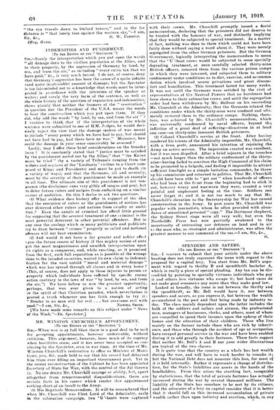MIL WINSTON CHURCHILL'S APPOINTMENT. (To Tat EDITOR OF THE ..151,C7ATOR.'l
Eou,—When war is at full blast there is a good deal to he said for Accepting appointments, however undesirable, without criticism. This argument, however, loses much of its cogency when hostilities cease, and it has never been accepted as con- vincing by the Spectator, oven in war time. At the time of Mr. Winston Churchill's restoration to office as Minister of Muni- tions; you, Sir, made bold to say that his record had debarred him from ever filling an important Government post. Yet in the recent reconstruction of the Cabinet he has been appointer! Secretary of State for War, with the control- of the Air thrown in. No one deities Mr. Churchill courage or ability, but, apart altogether from temperamental disqualifications, there . are certain facts in his career which render this appointment nothing short of an insult to the Army.
(I) His Reprisals Memorandum. It-will-be remembered-that when Mr. Churchill was First Lord of the Admiralty, early in the submarine campaign, two '13 '-boats were captured with their crews. Mr. Churchill promptly issued a florid memorandum, declaring that the prisoners did not deserve to he treated with the honours of war, and distinctly implying that they would he subjected to special treatment. As a matter of fact, nothing was done to them which could not hare been fairly done without saying a word about it. They were merely segregated from the other German prisoners. But the German Government, logically interpreting the memorandum to mean that the U'-bout crews would be subjected to 801110 specially degrading treatment, at once carefully selected thirty-nine British officers, removed them from the various prison camps in which they were interned, and subjected them to solitary confinement under conditions as to diet, exercise, and aceommos dation which involved severe privations and great discom- fort and humiliation. This treatment lusted for many weeks. It was not until the Germans were satisfied by the visit of representatives of the Neutral Powers that no brashness had been shown to their submarine crews, and until the segregation order bad been withdrawn by Mr. Balfour on his succeeding Mr. Churchill at the Admiralty, that the Germans relaxed the conditions under whirls the thirty-nine were confined and ulti- mately restored them to the ordinary camps. Nothing, there- fore, was achieved by Mr. Churchill's memorandum, which was universally- condemned by naval officers, beyond th.i infliction of a great deal of suffering—disastrous in at least one case—on thirty-nine innocent British prisoners.
(2) Colonel Churchill's service at the front. After having rendered his tenure of the Admiralty impossible, Mr. Churchill. with a beau gest', announced his intention of rejoining the Army on active service. The impression created was excellent, but it was soon dispelled. After a brief sojourn in the trenches —not much longer than the solitary confinement of the thirty. nine—having failed to convince the High Command of his claim to be promoted to a brigade, and finding it impossible to attract sufficient limelight as a simple battalion commander, he threw up his commission and returned to politic. That Mr. Churchill should have been able to "get out " when hundreds of officers who had been at the front from the beginning had to stick it out, however weary and war-worn they were, created a very painful and unpleasant feeling at the time. Soldiers can never forget it; and it is not too much to my that Mr. Churchill's elevation to the Secretaryship for War has caused consternation in the Army. In past years Mr. Churchill was popular with journalists, whom ho often provided with abun- dance of sensational personal " copy." The Dartmoor shepherd, the Sydney Street siege were all very well; but even the Northcliffe Press has now partially awakened to the monstrosity of entrusting our defences on land and in air to the men who, as strategist and administrator, was often the greatest menace to our command of the sea.—I am, Sir, &e..
G.


































 Previous page
Previous page